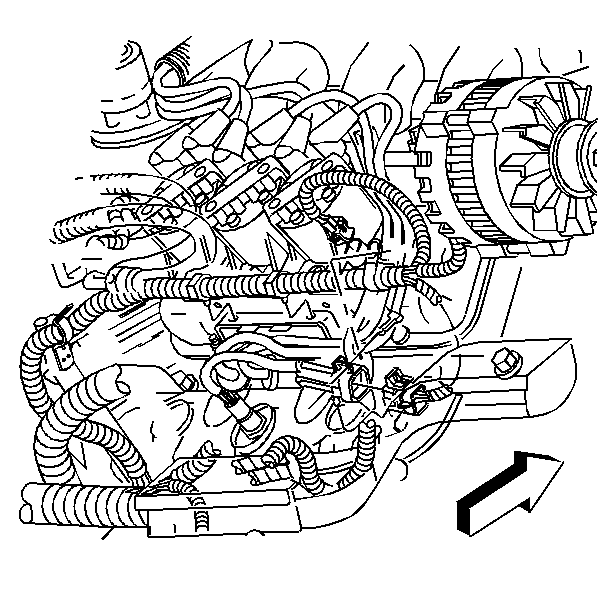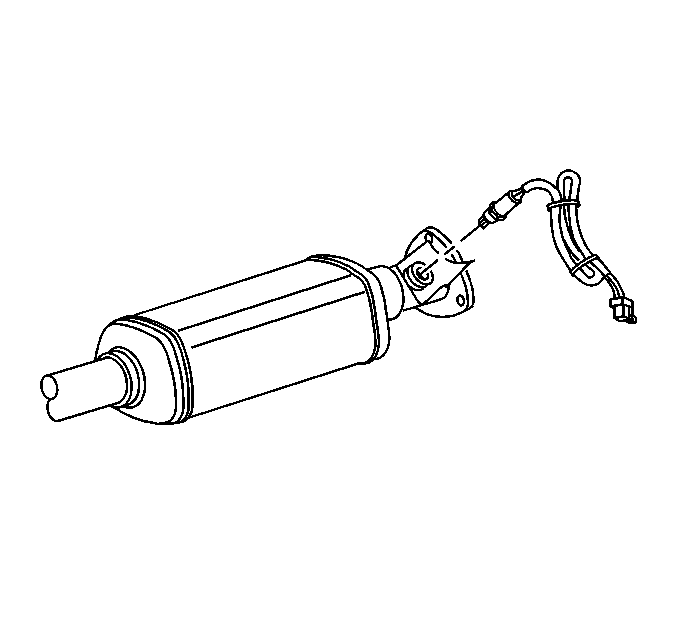Heated Oxygen Sensor Replacement HO2S 1
Removal Procedure
Tools Required
J 39194-B Heated Oxygen Sensor Wrench
Notice: The Heated Oxygen Sensor (HO2S) and the Oxygen Sensor use a permanently attached pigtail and connector. Do not remove this pigtail from the Heated Oxygen Sensor. Damage or the removal of the pigtail or the connector could affect the proper operation of the sensor.
Take care when handling the HO2S and the O2S. Keep the in-line electrical connector and the louvered end free of grease, dirt, or other contaminants. Also avoid using cleaning solvents of any type. Do not drop the HO2S or the O2S. Do not roughly handle the HO2S or the O2S.Notice: Remove oxygen sensors with the engine temperature above 48°C (120°F). Otherwise the oxygen sensors may be difficult to remove.
Notice: A special anti-seize compound is used on the oxygen sensor threads. New service sensors should already have the compound applied to the threads. Coat the threads of a reused sensor with anti-seize compound P/N 5613695 or equivalent.
Notice: The use of excessive force may damage the threads in the exhaust manifold/pipe.
The heated oxygen sensor may be difficult to remove when engine temperature is below 48°C (120°F).
- Turn OFF the ignition.
- Disconnect the electrical connector.
- Carefully back out the heated oxygen sensor.

Installation Procedure
- Coat the threads of heated oxygen sensor with anti seize compound, or equivalent if necessary.
- Install the heated oxygen sensor.
- Connect the electrical connector.

Notice: Use the correct fastener in the correct location. Replacement fasteners must be the correct part number for that application. Fasteners requiring replacement or fasteners requiring the use of thread locking compound or sealant are identified in the service procedure. Do not use paints, lubricants, or corrosion inhibitors on fasteners or fastener joint surfaces unless specified. These coatings affect fastener torque and joint clamping force and may damage the fastener. Use the correct tightening sequence and specifications when installing fasteners in order to avoid damage to parts and systems.
Tighten
Tighten the H02S 1, pre-catalytic converter, to 42 N·m
(31 lb ft).
Heated Oxygen Sensor Replacement HO2S 2
Removal Procedure
Tools Required
J 39194 Oxygen Sensor Wrench
The heated oxygen sensor may be difficult to remove when engine temperature is below 48°C (120°F). Excessive force may damage threads in exhaust manifold or exhaust pipe.
Notice: The Heated Oxygen Sensor (HO2S) and the Oxygen Sensor use a permanently attached pigtail and connector. Do not remove this pigtail from the Heated Oxygen Sensor. Damage or the removal of the pigtail or the connector could affect the proper operation of the sensor.
Take care when handling the HO2S and the O2S. Keep the in-line electrical connector and the louvered end free of grease, dirt, or other contaminants. Also avoid using cleaning solvents of any type. Do not drop the HO2S or the O2S. Do not roughly handle the HO2S or the O2S.Notice: Remove oxygen sensors with the engine temperature above 48°C (120°F). Otherwise the oxygen sensors may be difficult to remove.
Notice: A special anti-seize compound is used on the oxygen sensor threads. New service sensors should already have the compound applied to the threads. Coat the threads of a reused sensor with anti-seize compound P/N 5613695 or equivalent.
- Turn OFF the ignition.
- Raise the vehicle. Refer to Lifting and Jacking the Vehicle in General Information.
- Disconnect the electrical connector.
- Using special tool J 39194-B heated oxygen sensor wrench carefully back out the heated oxygen sensor.

Caution: To avoid any vehicle damage, serious personal injury or death when major components are removed from the vehicle and the vehicle is supported by a hoist, support the vehicle with jack stands at the opposite end from which the components are being removed and strap the vehicle to the hoist.
Important: A special anti-seize compound is used on the heated oxygen sensor threads. The compound consists of graphite suspended in fluid and glass beads. The graphite will burn away, but the glass beads will remain, making the sensor easier to remove. New or service sensors will already have the compound applied to the threads. If a sensor is removed from an engine and if for any reason is to be reinstalled, the threads must have anti-seize compound applied before reinstallation.
Installation Procedure
- Coat the threads of heated oxygen sensor/catalyst monitor with anti-seize compound P/N 5613695, or equivalent if necessary.
- Using J 39194-B oxygen sensor socket install the heated oxygen sensor.
- Connect the electrical connector.
- Lower the vehicle.

Notice: Use the correct fastener in the correct location. Replacement fasteners must be the correct part number for that application. Fasteners requiring replacement or fasteners requiring the use of thread locking compound or sealant are identified in the service procedure. Do not use paints, lubricants, or corrosion inhibitors on fasteners or fastener joint surfaces unless specified. These coatings affect fastener torque and joint clamping force and may damage the fastener. Use the correct tightening sequence and specifications when installing fasteners in order to avoid damage to parts and systems.
Tighten
Tighten the H02S 2, post-catalytic converter, to 42 ±4 N·m
(31 lb ft).
